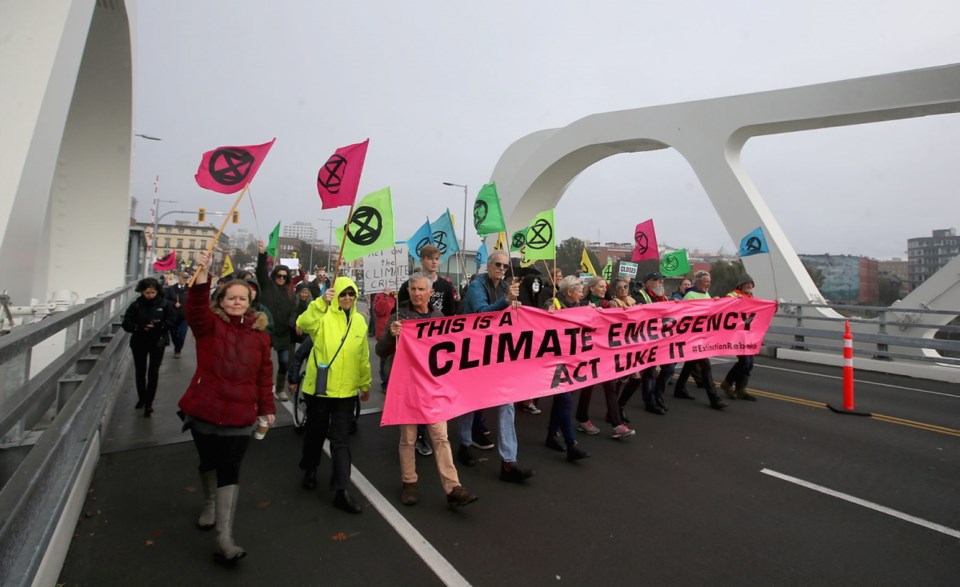Climate-change protests are the latest in an ever-growing list of activities COVID-19 has put on hold, raising concerns about the movement’s momentum.
In a day of global climate strikes in late September last year, protesters in Victoria walked out of classrooms and workplaces at 11 a.m., and a crowd that rivalled the size of Canada Day celebrations filled the legislature lawn to hear urgent calls to action from young activists.
This year, concerns about the pandemic have subdued activities and pushed some online. Friday marked the first Fridays for Future, a global day of action on climate change, for the new school year. In Victoria, instead of marching in the streets, people tried to show support in quieter ways.
Our Earth, Our Future, a group of young people pushing for stronger climate action, decided against organizing an in-person event due to pandemic safety concerns.
They encouraged people to wear green pins to school or work to show their support for climate action instead.
Theo Munkacsi, a member of the group, said they’re thinking about holding information sessions online later in the fall, but have no plans for in-person protests or events.
Global climate strike rallies were held last year in Nanaimo, Qualicum Beach, Courtenay, Campbell River, Port Alberni, Ucluelet and Tofino, and North Pender, Mayne, Gabriola and Denman islands.
Those large demonstrations, the kind that fill public spaces and make headlines and the evening news, help to raise awareness and attract more people to advocate for strong climate policy, said Will Greaves, an assistant professor of political science at the University of Victoria.
“Not having those kinds of large, spectacular, peaceful public actions really weakens the ability to get the message out to a broader public, which is pretty much the central purpose of having those kinds of marches and rallies,” he said.
Greaves said large demonstrations can put pressure on governments and act as a visual reminder that a significant number of people want to see more action on an issue.
In addition to causing a shift in how activists are getting their message out, Greaves said the pandemic has stalled momentum on climate-change policy at all levels of government, while local, provincial and federal officials grapple with COVID-19 response and recovery.
“There’s definitely momentum that has already been lost in the course of the pandemic. And it remains to be seen whether any of it can be regained, both on the policy side, but also on the social movement-building side,” he said.
Greaves said he finds hope in the fact that many spearheading the movement are passionate young people.
While the pandemic has drawn attention away from climate change, the shutdown of normal daily life presents an opportunity for change as the world rebuilds, said Munkasci, a Grade 9 student at Esquimalt High School.
“That’s actually what people are striking for today, was for a just recovery. And the theme was ‘Not Back to Normal.’ Which kind of means like, we don’t want to go back to the way things were before the pandemic. And we want things to be better for the future,” he said Friday.
In Port Hardy, where two climate strikes were held last year, one group used the day of global strikes to launch a new initiative.
Grassroots Learning Centre hopes to raise support for climate action with the North Island Climate Hub. The group is encouraging people to sign their declaration, which aims to make northern Vancouver Island communities a role model for climate action in rural and remote communities, said Dawn Moorhead, executive director of the centre.
They plan to offer Zoom presentations on climate-change science and policy for any interested group, led by two members who have completed a two-week online training with Al Gore, a former vice-president of the United States and advocate for action on climate change.
“It could be a workplace, it could be a club, it can be a family, or an organization. It could be friends. Anyone who wants to learn more,” Moorhead said.
Gore was featured in the 2006 documentary An Inconvenient Truth, which followed his campaign to inform people about climate change, and he shared a Nobel Peace Prize with the Intergovernmental Panel on Climate Change in 2007 for their efforts to disseminate information about climate change.
Physically distanced climate strikes were held this year in some Canadian cities, including Vancouver, Toronto and Halifax.
regan-elliott@timescolonist.com



